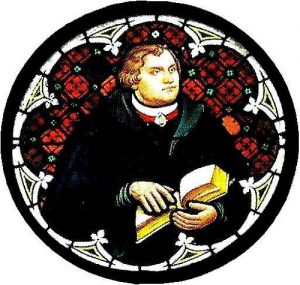Lectionary Reflection, Reformation Sunday, Year C, October 30, 2016
So if the Son makes you free, you will be free indeed. John 8:36
A Christian is a perfectly free lord of all, subject to none. A Christian is a perfectly dutiful servant of all, subject to all.” – Martin Luther, “On the Freedom of a Christian,” Three Treatises, (Fortress Press), 1970, 277
Here’s a timely question to contemplate: How well do you steward your freedom? During the current campaign season in the United States there has been considerable talk about preserving freedom, about who has freedom and what that means, and even about what truly constitutes freedom. Of course the kind of freedom that is soaking up social media space, cable time, and airwaves is not the same sort of freedom that  Jesus is talking about in the lesson from John’s gospel this week. Yet there are some intriguing parallels worth exploring (albeit quite carefully), especially if you are observing Reformation Sunday.
Jesus is talking about in the lesson from John’s gospel this week. Yet there are some intriguing parallels worth exploring (albeit quite carefully), especially if you are observing Reformation Sunday.
The short gospel lesson gives us Jesus explaining what constitutes freedom. They’re clearly not buying that they need this kind of freedom, given their Abrahamic pedigree. Jesus lays it out pretty simply: If you sin, you’re a slave to sin, and you’re not really a part of the family, pedigree or no pedigree. Ouch! The remedy is pretty simple according to Jesus. Follow him. Abide in his word. Only the Son can set one free—really FREE. Only God can write on our hearts so that we can truly know and be in relationship with our Creator.
This would be a good Sunday to dust off Martin Luther’s tract On the Freedom of a Christian (1520), especially in light of the fact that we stand on the eve of the 500th anniversary of the Protestant Reformation, and for those of us in the United States we’re in the final days of pre-election fury and fervor. Luther echoes Jesus’ teaching in this week’s gospel lesson with his paradoxical pronouncement that a Christian is completely  free and beholden to no one, yet also completely bound to serve all and intertwined in fate and mission with all. It’s a view of freedom that is fully relational and interdependent and completely and utterly dependent upon Christ.
free and beholden to no one, yet also completely bound to serve all and intertwined in fate and mission with all. It’s a view of freedom that is fully relational and interdependent and completely and utterly dependent upon Christ.
Talk about countercultural! Forget the vain promises of the world, the polarizing pander of candidates for public office, and the bootstraps mentality of contemporary culture. Jesus says, in effect, if you want to be truly free then you’re going to be bound to me and to your neighbor. Real freedom is found only in deep relationship with God and with God’s people. We’re not talking only God’s people who look, act, and think like us, either; we’re talking ALL of God’s beloved people.
Chances are that anxieties may be running higher in your context, given the news and the fear-mongering happening on both sides of the social and political spectrum. Folks need to hear some truly good news, a gospel antidote to a sin-sick world. Whatever happens on November 8, whichever candidates are elected (or not), our freedom and hope are still found only in Jesus. We will wake up on November 9, and we will still be called into relational, interdependent freedom in Christ. And it is in this freedom alone, that together we can work to make Christ known and help usher in the Lord’s reign right here and now. This is, my friend, some very good news.
Take a deep breath. Give thanks for the bold, imperfect, and inspired witness of reformers like Martin Luther and others throughout history. Give thanks to God for the truth that sets us truly free. Give thanks for the freedom found in being a Christ follower. Now exhale and be sent into the world once again to share this very good gospel.
Oh, and about that question — How well you steward your freedom? Give it some thought and prayer. The answer I keep coming up with is that I steward my freedom only as well as I am willing to love and submit to Christ and my neighbor. How about you?
In Worship
Consider how you might most effectively use Psalm 46 this Sunday. What about a dramatic reading for multiple voices? How about crafting a video or PowerPoint to accompany it? If you traditionally sing the psalm, consider writing a version of this psalm for a Call to Worship or a Sending litany. Alternate the verses with the spoken response “A mighty fortress is our God; a bulwark never failing”–especially if you are singing that hymn at some point during worship.
With Youth
We can’t save ourselves–no matter how hard we try! Yet, still, it is our human nature to want to DO something to make a difference, to be good or better, to have some part in pleasing God. Revisit Romans 3:19-28 today and discuss the basics of Martin Luther’s tract On the Freedom of a Christian. The words ring equally true today and echo Jesus’ words in John’s gospel, and Paul’s words in Romans. Explore with the youth how instead of striving for independence as the ideal of freedom, that in Christ we lift up our interdependence on one another and God as the ideal of freedom.
With Children
The Old Testament Lesson (Jeremiah 31:31-34) can be a tough one for small children to understand. How is God’s law written on our hearts? How do we know God when we can’t even see God? Let the children know that even though we can’t see God like we can see each other or our parents, God names and claims us in baptism. We know God through what we learn in scripture and through preaching and teaching. Even our very breathing is actually like God’s name. Share with them the Hebrew name for God: YHWH (Yahweh) and how when you whisper it, it sounds like breath or a slight wind. God’s very name is within us and without us, like our breath.
(Photo: Osajus, Michael Mandiberg, and , Creative Commons. Thanks!)



Leave a Reply